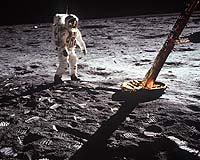 |
Paris (AFP) July 20, 2009 The European Space Agency (ESA), on the 40th anniversary of the first lunar landing, said Monday any return to the moon had to be more than a flag-planting mission and multinational cooperation was key. ESA Director-General Jean-Jacques Dordain said that in 1969, Apollo 11's exploit was seen in terms of superpower rivalry, but today perceptions had changed. "I think the most important thing, and what will be remembered far longer, is that astronauts discovered planet Earth; they saw Earth resembling a small blue marble' floating in the Universe," he said in a press release. "They were able to bring back to Earth the notion that our future is a global one and that we have to think about the future of Earth globally, and not individually." Looking at a return to the moon, Dordain said "the aim would no longer be to plant a flag there". "The idea would be to use the moon as just another part of our environment, in order to make scientific progress, or to establish a warning system against asteroids or anything else threatening Earth, or as a source of resources to take back to Earth," he said. He added: "I am sure humans will return to the moon, but they will go to the moon together and not in the context of two competing countries." Dordain spelt out Europe's cautious strategy on human space flight, and said that this approach applied to the US goal of returning to the moon by 2020. ESA has a manned space programme, but does not have a manned spacecraft or rocket. Its astronauts are lofted to the International Space Station (ISS) by the US space shuttle or aboard Russia's Soyuz rocket-and-capsule system. Instead, the agency places its major focus on exploration by robot spacecraft and on Earth-observation satellites, where it is highly regarded. Dordain said Europe could make a "contribution" to a US-led lunar programme, providing "some interesting technologies" where it was a world leader. Another scenario would be for Europe to develop its own crew transporter, but "that is a choice to be made at political level, not at agency level," Dordain said. France -- one of the biggest contributors to ESA's budget -- said on Monday Europe should be a team player in a lunar return but no more than that. "France's position, and one that will be expressed at a major meeting in Europe this autumn on the question of manned space flight, is that we cannot be absent from this great adventure but we cannot undertake it by ourselves," said Valerie Pecresse, minister of higher education and research. "It is not possible for Europe to go solo today, it's too costly. On the other hand, we could take part in a worldwide venture, with the United States, Russia and others." ESA comprises 16 members of the European Union (EU) plus Norway and Switzerland. Canada takes part in some of its projects under a cooperation agreement. Share This Article With Planet Earth
Related Links Mars News and Information at MarsDaily.com Lunar Dreams and more
 Video of first moon walk gets touch-up
Video of first moon walk gets touch-upWashington (AFP) July 16, 2009 NASA on Thursday unveiled restored video footage of man's first steps on the moon, 40 years to the day after Apollo 11 blasted off on its historic voyage into space. The first installment of a more extensive project, the video includes 15 restored key moments from the mission led by astronauts Neil Armstrong, Buzz Aldrin and Michael Collins, the US space agency said. The video was only ... read more |
|
| The content herein, unless otherwise known to be public domain, are Copyright 1995-2009 - SpaceDaily. AFP and UPI Wire Stories are copyright Agence France-Presse and United Press International. ESA Portal Reports are copyright European Space Agency. All NASA sourced material is public domain. Additional copyrights may apply in whole or part to other bona fide parties. Advertising does not imply endorsement,agreement or approval of any opinions, statements or information provided by SpaceDaily on any Web page published or hosted by SpaceDaily. Privacy Statement |